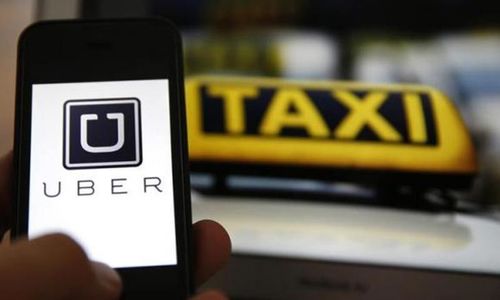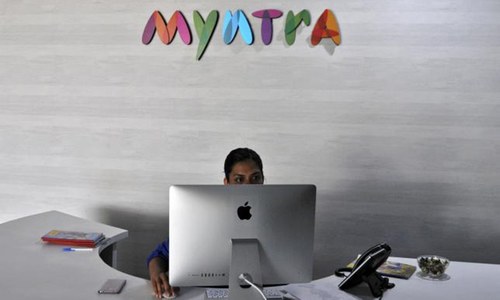Modelled after Uber, a company that has become a household name internationally, Dubai-based Careem officially entered the Pakistani market in October last year, offering an app, a website and a helpline where customers can order rides. The private car-hire service promises "affordable, chauffeur-driven cars at the touch of a button".
How it works
You first select your pick-up and drop-off location using the app’s built in mapping system.
Without jumping around too many screens, Careem cites the total cost of the trip, which you can either book immediately (base rate Rs150) or schedule for a later time (base rate Rs250) in the day.

The app instantly sends a profile and photograph of the driver — called the 'Captain' — who is on his way to pick you up.
Details include the model, colour and license plate of the car so you can keep an eye out for him. Customers are also given an option to track the ride, presumably in an effort to make users feel secure.
We try it out
My colleagues booked a Careem from the Dawn office on Ziauddin Ahmed Road Karachi to Karachi University this month. Fortunately, Careem is offering a flat rate promotion for February, charging Rs220 for a one-way ride between 11am and 4pm during the weekdays and Rs320 after 4pm. However, the promotion applies to a 12km ride and those who want to travel further pay Rs25/km.
At the end of the ride, they got an email detailing the distance and bill, explaining what the original bill would have been without this deal.

I booked a Careem ride to attend the Khi Eat Food Festival last month, for which the service was offering a promo code and flat rate of Rs200 for a ride to the festival. The car, a latest Toyota Corolla model, arrived in 5 minutes, and the captain was polite.
Four people in our office who tested the service had positive reviews about the drivers, which was initially a concern because there isn't a clear indication of their hiring process and background checks.
After some Q & A with one driver, we learnt that the fleet of cars belong to a car rental company and the drivers were approached through them. It appears that Careem asks for proof of ID documents, a driving license and also may conduct an interview before taking a driver on board.
"My family is from South Waziristan, but we live in Karachi because my two girls are doing their O Levels," the driver said. He seemed convinced that rickshaws and taxis would be hurt by the service as the promo rates are very low.
"And these promos will stay on — because Uber is coming."
Careem could be the daily commuter’s solution to traffic woes, but one wonders how the service plans on sustaining its attractive promo codes which offer discounted rates to new customers and during festivals.
It isn’t clear how Careem plans on convincing its customers to pay hefty fares for rides once the promo code days are over. A taxi or rickshaw might not be available at the click of a few buttons, but it costs half as much for only a bit more effort.
In Uber's shadow
Careem was founded in 2012 in Dubai, with the simple mission to provide convenient, reliable and comfortable transport services to customers. It has since grown to cover 26 cities in the Middle East and North African region (MENA) and Pakistan, where it is currently operational in Karachi and Lahore.
Careem’s San Francisco based rival, Uber, has been leading the global market in private car hire and has been valued at as much as USD 50 billion. Compared to Careem’s two years in the market, Uber has been around for six years and is operating across 300 cities worldwide.
But Careem claims it has a stronghold over the markets in Saudi Arabia and Egypt, countries it began operations in before Uber did. It expects to mirror its success in Pakistan for the same reason, and claims its dedicated efforts to localise its product set it apart from Uber.
Uber’s ‘cashless’ policy, for example, gave the company a hard time in India where commuters use paper money more often than cards. This was amended and a cash payment option was introduced. But Careem is keeping a close eye on the mammoth transport service and from the get-go is accepting both cash and card payments.

Who wins?
Uber has mentioned plans of launching in Pakistan, and has recently begun hiring in Lahore. In December, Uber announced it has put $250 million towards expanding in MENA. In the same month, Careem announced raising $60 million from investors. Both have Pakistan’s market in mind, since the country’s mobile user base exceeds 125 million users, with over 23 million 3G/4G subscribers since the introduction of 3G in late 2014.
Read more: Uber to launch ride services in Pakistan
A competition between the two companies is imminent. Gaining a stronghold in the Pakistani market depends on which company can adapt to its users' needs the fastest. For example, while Uber has faced a safety lapse in India, Careem is differentiating itself by not taking on individual drivers at the moment.
“This allows us to examine existing employment records… and conduct a Nadra verification of the Captain’s identities,” Junaid Iqbal, Careem's managing director explains. Although he mentions no explicit plans of working with individually-hired drivers in the future, Iqbal boasts that Careem will work closely with one of Pakistan’s “leading security companies” to develop a detailed background check system.
Safety concerns
Iqbal says female empowerment is a priority for the company. “Over 30 per cent of rides every day are hailed by women.”
In a country where public transport for women is marred with the stigma of being unsafe, this claim could prove to be vital for the company’s future progression.
Explore: Double-a double-a! Nine ways to survive public buses in Karachi

The verdict
A quick browse through the company’s Facebook page reveals that very few people complain of sub-par experiences. Most Captains arrive to pick up their customers on time, and customers seem satisfied with the pricing, though then again, Careem is handing out generous discounts these days.
According to customer reviews on Careem’s Facebook page, several people have run into technical bugs and badly coordinated service. One reviewer says she paid a cancellation fee despite having cancelled her ride well in advance. Another says that moments before his ride was scheduled to arrive, he was told there were no Captains.
Do you want your product/service reviewed? Email us at web@dawn.com

















































